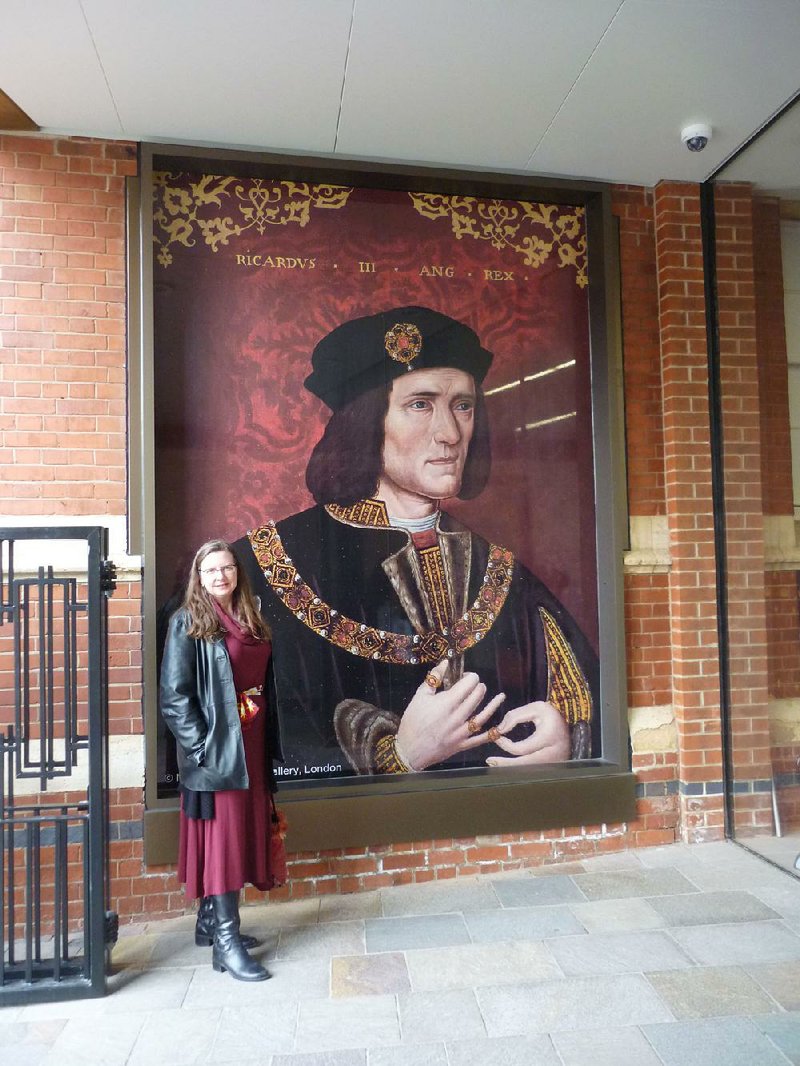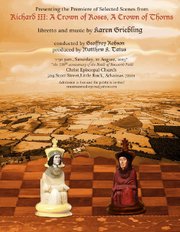Karen Griebling believes Britain's 15th-century King Richard III has gotten a very raw deal.
The chief raw dealer would be William Shakespeare, who depicted Richard in his play of the same name as a scheming, conniving, murderous hunchbacked villain who was justly overthrown and killed in the 1485 Battle of Bosworth. Among the several murders Shakespeare laid at Richard's feet: his brother and patron, King Edward IV, and Edward's two young sons, known to history as the "princes in the Tower."
Richard III:
A Crown of Roses,
A Crown of Thorns
7:30 p.m. Saturday, Christ Episcopal Church, 509 Scott St., Little Rock. Selected scenes from a new opera, music and libretto by Karen Griebling. Tenor and co-producer Matthew K. Tatus sings the title role. Geoffrey Robson conducts.
Free
Email: musicianmail-opera@…
Griebling, a violist with the Arkansas Symphony Orchestra and the Cross Town Trio and a member of the music faculty at Hendrix College in Conway, tries to set Richard's record straight in her full-length, four-act opera, Richard III: A Crown of Roses, A Crown of Thorns.
A cast of 16 singers that Griebling and co-producer Matthew K. Tatus have drawn from Opera in the Rock, the University of Central Arkansas and Hendrix College in Conway and the University of Arkansas at Little Rock will premiere 10 scenes in a concert version Saturday at downtown Little Rock's Christ Episcopal Church.
Geoffrey Robson, associate conductor of the Arkansas Symphony Orchestra, will conduct the singers and a couple of dozen members of the orchestra.
The performance takes place on the 530th anniversary of the Battle of Bosworth.
Griebling says her first exposure to the Shakespeare play and the film that Laurence Olivier made from it was the germ of what has turned out to be a 40-year obsession.
"It's an incredible work of art," she says of Shakespeare's history play, "but I began to wonder whether anybody could be as bad as that."
Reading Paul Murray Kendall's 1955 biography of Richard cemented her determination to tell the story from a different perspective, through the medium of opera.
"Art carries a powerful message, and I was determined to answer art with art," she says. "This opera to redress an injustice of over 500 years and to rehabilitate the reputation of Richard III by showing him as he was, a human being, an able monarch and military leader who was concerned with the welfare of his subjects, introduced progressive laws, and had a reputation for justice and fairness in his own day."
She compiled some preliminary sketches, some of which have survived into the finished opera, which she completed in December. She describes the music as having a "contemporary harmonic palette," much richer than the medieval/Renaissance norm, but which evokes "the spirit of the 15th century" through various period techniques and quotations of period tunes.
"The audience will come away thinking this is a tonal piece," she says, more along the lines of 16th-century opera composer Claudio Monteverdi than 19th-century opera composer Giuseppe Verdi.
Robson says working on a new score "is a liberating experience ... as I play through it, humming some parts, singing others, feeling out the harmonies. You don't have that weight of [performance] history you'd have with, say, Beethoven."
The "pit band," he says, is "not a Wagnerian orchestra." There's a focus on double reeds (the two oboe players -- what Shakespeare and others of his era called "hautbois" -- double on English horn; the two bassoonists double on contrabassoon). The trumpets and trombones recall the sound of period predecessors shawms and sackbuts.
In compiling the text, she shunned Shakespeare's play, although in his defense, she acknowledges that the Bard of Avon was currying favor with the then-reigning Tudor regime that had replaced Richard III in 1485 in the battle that ended the long-running so-called "Wars of the Roses" between the Plantagenet House of York (white rose) and the upstart House of Lancaster (red rose).
Instead she turned to primary 15th-century historical sources -- 85 percent to 90 percent taken directly from medieval texts, she says, plumbing, among other British resources, the Richard III Society, York Minster Cathedral and the York Civic Archive Trust, the Oxford University Bodleian Library, the Cambridge University Newton Library and Queen's College, the Lambeth Palace Library and the British Library, where she found "records of Richard's plans to send the boys [Edward IV's sons] to Margaret in Burgundy ... and there remains no evidence that Richard killed them."
The cast, many of whom are taking on two or more roles, also includes sopranos Kara Claybrook, Stephanie Smittle, Jaimee Jensen and Arlene Biebesheimer; mezzo-soprano Hannah Smashey; tenors Chase Burns and Daniel Foltz-Morrison; baritones Rob Holden, Ron McDaniel, Andrew Morgan and Jerry Biebesheimer; and basses George Mayo and Phillip J. Murray. The singers will get some coaching on period pronunciation and dialects; the text is mostly in English, but with some incidental texts in Latin and French.
She admits that it has taken her those 40 years to build up the skills she has needed to create this full-length piece, not so much the music -- "I [started] writing music at age 4, so that was the easy part" -- but learning how to read French, Latin and medieval English and the proper method of examining rare manuscripts in closed-stack libraries. In the interim, she has composed a catalog of works for various instrumental combinations and full symphony orchestras, and two previous operas for which she also wrote her own librettos.
Griebling says the discovery of Richard's "mortal remains" under a car park (what the British call a parking lot) in 2012 in the British city of Leicester gave her a swift kick toward completing the opera. She traveled to England to be among the 35,000 taking part in the March 2015 reburial ceremonies in Leicester and York.
Tatus, a tenor and a co-founder of Opera in the Rock, will sing the title role, which he cemented as his own in February when he sang Richard's part in a portion of the opera (Act IV Scene 2) with piano at the Conway Composers Guild Annual Concert. "I was convinced: 'That's my Richard,'" Griebling recalls.
"I'm a real big proponent of new music," Tatus says. "It's exciting to originate a work and getting to be the first person to touch it." In doing a new work for the first time, he adds, "there's no one to imitate. You make all the artistic decisions yourself. It's liberating -- and terrifying."
Style on 08/18/2015

